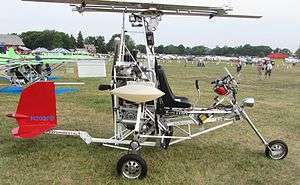Roadable aircraft
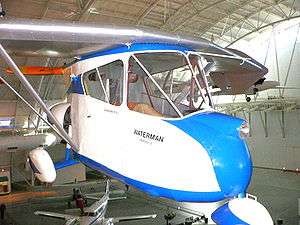

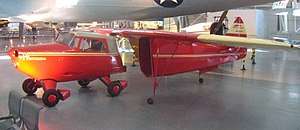
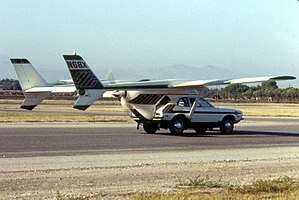
A roadable aircraft (also referred to as a flying car) is a hybrid vehicle that combines the flying capability of an aircraft with the option of being driven as an automobile on the ground. The roadable aircraft is typically recognized as a small plane with retractable wings that has both the freedom to fly in the open sky and drive conveniently and flexibly along roads.
Most roadable aircraft fall into one of two styles: integrated (all components can be carried in the vehicle, or on a trailer attached to the vehicle), or modular (some aeronautical sections are left at the airport while the vehicle is driven).
In the U.S., the Defense Advanced Research Projects Agency (DARPA) has shown an interest in the concept with a $65 million program called Transformer to develop a four-person roadable aircraft by 2015.[1] The vehicle is required to take off vertically, and have a 280-mile range. AAI Corporation and Lockheed Martin were awarded contracts in late 2010 for the Phase 1 program.[2] Lockheed Martin's design was selected to continue to Phase 3.[3]
In April 2012, the International Flying Car Association was established to be the "central resource center for information and communication between the flying car industry, news networks, governments, and those seeking further information worldwide".[4] Because flying cars need practical regulations that are mostly dealt with on a regional level, several regional associations were established as well, with the European Flying Car Association (EFCA) representing these national member associations on a pan-European level (51 independent countries, including the European Union Member States, the Accession Candidates and Russia, Switzerland, Turkey, Ukraine).[5] The associations are also organizing racing competitions for roadable aircraft in Europe, the European Roadable Aircraft Prix (ERAP), mainly to increase awareness about this type of aircraft among a broader audience.[6]
History
Glenn Curtiss, the chief rival of the Wright brothers, was the first to design a roadable aircraft. His large, three-wing Curtiss Autoplane was able to hop, but not fly.[7]
In 1935, inventor Constantinos Vlachos built a prototype of a 'tri-phibian' vehicle that caught fire after the engine exploded, while Vlachos was demonstrating it in Washington, D.C. Vlachos' prototype is most notable for a newsreel that captured the incident,[8] which left him in hospital for several months.[9][10]
The Autogiro Company of America AC-35 was an early attempt at a roadable aircraft. On March 26, 1936 the AC-35 was flown by test pilot James G. Ray with counter-rotating propellers. These were later replaced with a single conventional propeller arrangement. On October 2, 1936, Ray landed the AC-35 in a downtown park in Washington, D.C. where it was displayed. On October 26, 1936, the aircraft was converted to roadable configuration.[11] Ray drove it to the main entrance of the Commerce Building, where it was accepted by John H. Geisse, chief of the Aeronautics Branch. Although it was successfully tested, it did not enter production.
The first roadable fixedwing aircraft actually to fly was built by Waldo Waterman. Waterman was associated with Curtiss while Curtiss was pioneering amphibious aircraft at North Island on San Diego Bay in the 1910s. On March 21, 1937, Waterman's Arrowbile first took to the air.[12] The Arrowbile was a development of Waterman's tailless aircraft, the Whatsit.[13] It had a wingspan of 38 feet (12 m) and a length of 20 feet 6 inches (6.25 m). On the ground and in the air it was powered by a Studebaker engine. It could fly at 112 mph (180 km/h) and drive at 56 mph (90 km/h).
In 1942, the British army built the Hafner Rotabuggy, an experimental roadable autogyro that was developed with the intention of producing a way of air-dropping off-road vehicles. Although initial tests showed that the Rotabuggy was prone to severe vibration at speeds greater than 45 miles per hour (72 km/h), with improvements the Rotabuggy achieved a flight speed of 70 mph (113 km/h).
However, the introduction of gliders that could carry vehicles (such as the Waco Hadrian and Airspeed Horsa) made the Rotabuggy superfluous and further development was cancelled.[14]
Although several designs (such as the ConVairCar) have flown, none have enjoyed commercial success, and those that have flown are not widely known about by the general public. The most successful example, in that several were made and one is still flying, is the 1949 Taylor Aerocar.
One notable design was Henry Smolinski's Mizar, made by mating the rear end of a Cessna Skymaster with a Ford Pinto, but it disintegrated during test flights killing Smolinski and the pilot.
At the 2014 Pioneers Festival at Wien (Austria) AeroMobil presented their version 3.0 of their flying car. The prototype was conceived as a vehicle that can be converted from an automobile to an aircraft. The version 2.5 proof-of-concept took 20 years to develop, and first flew in 2013. CEO Juraj Vaculik said that the company planned to move flying cars to market: "the plan is that in 2017 we’ll be able to announce… the first flying roadster."[15]
List of roadable aircraft
| Type | Date/Era | Description | Designer/Developer | Status |
|---|---|---|---|---|
| Curtiss Autoplane | 1917 | Modular airplane | Glenn Curtiss / Curtiss-Wright | Prototype |
| Skroback Roadable Airplane | 1925–1942 | Integrated airplane | Frank E. Skroback | Prototype |
| Autogiro Company of America AC-35 | 1935–1942 | Integrated autogyro | Autogiro Company of America | Flying prototype |
| Waterman Arrowbile | 1935–1957 | Integrated airplane | Waldo Waterman / Watermann Arrowplane Co. | Flying prototype |
| Gwinn Aircar | 1935–1938 | Modular airplane | Joseph M. Gwinn, Jr. / Gwinn Aircar Company, Inc. | Flying prototype. Crashed. |
| Southernaire Roadable | 1939 | Ted Hall / Southern Aircraft Co. | Flown | |
| Jess Dixon's flying auto | 1940 | Integrated copter | Jess Dixon | Flying prototype, patent |
| Hafner Rotabuggy | 1942–1944 | Integrated autogyro | Raoul Hafner / R. Malcolm Ltd | Flying prototype |
| Airmaster | 1944 | Modular airplane | Herbert & Helen Boggs | Concept |
| Fulton Airphibian | 1946 | Modular airplane | Robert Edison Fulton, Jr. / Continental Inc | Prototype |
| Convair Model 116 ConVairCar | 1946 | Modular airplane | Ted Hall / Convair | Flying prototype |
| Convair Model 118 ConVairCar | 1947–1948 | Modular airplane | Ted Hall / Convair | Flying prototype |
| Aerauto PL.5C | 1946–1953 | Integrated airplane | Luigi Pellarini / Carrozzeria Colli | Prototype |
| Aerocar | 1946–1960s | Modular airplane | Moulton Taylor / Aerocar International | Flying prototype |
| Bryan Autoplane | 1953–1974 | Integrated airplane | Leland Bryan | Flying prototype. Crashed. |
| BelGeddes | 1954 | Modular airplane | Norman Bel Geddes | Concept |
| Halsmer Aero Car | 1959 | Integrated airplane | Joseph Halsmer | Flew |
| Wagner Aerocar | 1965–1971 | Integrated helicopter | Alfred Vogt / Wagner | Flying prototype |
| AVE Mizar | 1971–1973 | Modular airplane | Henry Smolinski / Advanced Vehicle Engineers | Crashed, killing developer |
| Lebouder Autoplane | 1973-1977 | Modular airplane | Robert Lebouder | Flew successfully, won prizes until damaged in landing accident |
| AviAuto | 1981–1990s | Integrated airplane | Harvey Miller / Aviauto Corp / Florida Institute of Technology | Concept |
| Audi Pop.Up Next | 2018 | Quadcopter | Audi AG / Italdesign / Airbus | Prototype |
Current development examples
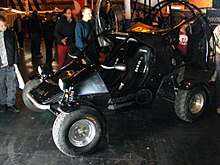
A number of companies are developing vehicles, although few have demonstrated a full-sized vehicle capable of free flight.
Flying cars
- The Parajet Skycar utilises a paramotor for propulsion and a parafoil for lift. The main body consists of a modified dune buggy. It has a top speed of 80 mph (130 km/h) and a maximum range of 180 miles (290 km) in flight. On the ground it has a top speed of 112 mph (180 km/h) and a maximum range of 249 miles (401 km). Parajet flew and drove its prototype from London to Timbuktu in January 2009.
- The Terrafugia Transition is under development by a private company founded by MIT graduates.[16] It is a roadable aircraft that the company describes as a "Personal Air Vehicle". The aircraft can fold its wings in 30 seconds and drive the front wheels, enabling it to operate as a traditional road vehicle and as a general aviation aeroplane. The company planned to release its Transition "Personal Air Vehicle" to customers in late 2011. An operational prototype was displayed at Oshkosh in 2008[17] and its first flight occurred on 2009-03-05.[18] Owners will drive the car from their garage to an airport where they will then be able to fly within a range of 500 mi (800 km). It will carry two people plus luggage and its Rotax 912S engine operates on premium unleaded gas.[19] It was approved by the FAA in June 2010,[20] and its anticipated base purchase price is $279,000.[21]
- Super Sky Cycle was an American homebuilt roadable gyroplane designed and manufactured by The Butterfly Aircraft LLC.[22][23] It is a registered motorcycle[24]
- PAL-V ONE is a hybrid of a gyrocopter with a leaning 3-wheel motorcycle. It has two seats and a 160 kW flight certified gasoline engine. It has a top speed of 180 km/h (112 mph) on land and in air, and weighs 910 kg max.[25][26]
- The Maverick Flying Dune Buggy was designed by the Indigenous People's Technology and Education Center of Florida as an off-road vehicle that could unfurl an advanced parachute and then travel by air over impassable terrain when roadways were no longer usable. The 1100-pound 'Maverick' vehicle is powered by a 128 hp (95 kW) engine that can also drive a five-bladed pusher propeller. It was initially conceived in order to help minister to remote Amazon rainforest communities, but will also be marketed for visual pipeline inspection and other similar activities in desolate areas or difficult terrain.[27]
- The Plane Driven PD-1 Roadable Glastar is a modification to the Glastar Sportsman GS-2 to make a practical roadable aircraft. The approach is novel in that it uses a mostly stock aircraft with a modified landing gear "pod" that carries the engine for road propulsion. The wings fold along the side, and the main landing gear and engine pod slide aft in driving configuration to compensate for the rearward center of gravity with the wings folded, and provide additional stability for road travel.[28][29]
- The Aeromobil 2.5 has folding wings and a Rotax 912 engine. It can travel at 200 kilometres per hour (124 mph) with a range of 690 kilometres (430 mi), and flew for the first time in 2013.[30][31] On October 29, 2014, Slovak startup AeroMobil s.r.o. unveiled AeroMobil 3.0[32] at Vienna Pioneers Festival,[33] a 2-person "Flying roadster" certified in Slovakia.[34]
Partially flying
- The Scaled Composites Model 367 BiPod is a developmental hybrid using joined fuselages, and twin combustion engines powering four 15 kW electric propellers.
Road functional, or scale models flying
- LaBiche Aerospace's LaBiche FSC-1[35] is a developmental prototype Flying Car and is an attempt to produce a practical flying car capable of utilizing today's automotive and aviation infrastructure to provide true "door-to-door" travel. The vehicle is intended to be parked in any garage or parking space available for cars. A design goal is to be capable of automatic conversion from aircraft to car at the touch of a button. LaBiche has flown a 1/10 scale model, tested a ¼-scale model and was last reported to be working on the FSC-1 prototype for road and air testing, as of 2006. It was hoped that upon approval from the FAA, a new satellite-navigation "hands free" flight system to travel from airport to airport might eliminate the need for a pilot's license. Numerous safety systems and fail safes are also planned on the FSC-1, such as a recovery parachute. No news has been added to the website since December, 2010.
- The Haynes Aero Skyblazer[36] is a development stage vehicle that uses a single turbofan engine to provide thrust in the air and to generate electricity to power electric motors for ground travel. In "car mode", a patented mechanism allows the wings to fold into the body of the vehicle, which is designed to fit into a single car garage and regular parking space. In "aircraft mode" the vehicle will have STOL capabilities and be able to use almost any public use airfield. It is expected to have a top speed of 400 mph (640 km/h) and a range of 830 miles (1,340 km). The skyblazer team has completed wind tunnel, stability and control testing and flown a 1/6 scale model.
- The Samson Switchblade,[37] by Samson Motorworks is a three-wheel concept with scissor wings. First introduced at AirVenture 2009, the Switchblade is to utilize a single motorcycle engine and ducted fan to keep the propeller out of harm's way on the ground. The wheels and propeller are to be powered by the same engine, but wheel-power only to be utilized on the ground. Development is ongoing at Swift Engineering of San Clemente, California. A predicted top speed of 100 mph (160 km/h) on the ground is nearly as fast as the anticipated 160 mph (260 km/h) in the air. No parts are left at the airport after conversion from aircraft to ground vehicle, as the main wing and tail assembly retracts into the vehicle body.[38][39] As of 22/01/2013, the team has also completed flight testing of a 1/4 scale model and are progressing onto building a full-scale remote controlled model.[40]
- The Krossblade SkyProwler is a flying small-scale version of their "switchblade"-type SkyCruiser concept, using mid-air conversion between quadcopter and fixed-wing. The wing is somewhat smaller than usual as the rotors perform the lift at low speed.[41][42][43][44]
- Carplane, Germany[45][46]
Concepts
- The Aerocar 2000 was a modular design developed in the early 2000s but never built.
- The iCar 101 project suggests the use of Flettner rotors in roadable aircraft design to combine compactness and increased lift potential.[47][48]
Popular culture
- Actor Bob Cummings owned one of four Aerocar I's, and the car appeared on his television show,[49] The New Bob Cummings Show, 1961–1962.
- The 1974 James Bond film The Man with the Golden Gun portrayed the villain escaping in a 1974 AMC Matador with a jet engine and wings mounted to the roof.
- In 2005, Monster Garage's hoster Jesse James built a roadable aircraft by combining an old Cessna with a Panoz Esperante.
See also
References
- ↑ Warwick, Graham. Leading Edge blog: DARPA's Transformer - a Humvee That Flies Archived 2013-10-23 at the Wayback Machine., AW&ST On Technology, Aviation Week online website, April 16, 2010. Retrieved May 10, 2013.
- ↑ Warwick, Graham. "Is Darpa's Fly-Drive Transformer on the Right Road?". Aviation Week. Archived from the original on 10 September 2013. Retrieved 3 September 2013.
- ↑ Olivarez-Giles, Nathan. "Lockheed Martin Building a Car-Transporting Drone for DARPA". The Verge. Retrieved 3 September 2013.
- ↑ "IFCA Announces Flying Cars About To Hit World Market". Various. 2 April 2012. Archived from the original on April 5, 2012. Retrieved 2 April 2012.
- ↑ "European Flying Car Association". EFCA. Retrieved 31 August 2015.
- ↑ "EFCA launches roadable aircraft competition in Europe". EFCA. Retrieved 21 March 2016.
- ↑ Thomas Vinciguerra (April 11, 2009). "Flying Cars: An Idea Whose Time Has Never Come". New York Times.
- ↑ Newsreel of flying car on fire on YouTube
- ↑ "News Cameras Film Thrilling Rescue". Popular Science. January 1936: 29.
- ↑ "Hard-Luck Vlachos". Special-Interest Autos. July 1974: 44.
- ↑ Dawson, Virginia; Mark D. Bowles (2005). Realizing the dream of flight: biographical essays in honor of the centennial of flight, 1903–2003. National Aeronautics and Space Administration, NASA History Division, Office of External Relations. p. 70. ASIN B002Y26TM0.
- ↑ id=WScDAAAAMBAJ&pg=PA52&dq=Popular+Science+1932+plane&hl=en&ei=TYpLTZ3EM8L38Abb2pmzDg&sa=X&oi=book_result&ct=result&resnum=2&ved=0CC4Q6AEwATge#v=onepage&q&f=true "Plane Sheds Wing To Run On Ground" Popular Science, May 1937
- ↑ "Tailless Flivver Plane Has Pusher Propeller" Popular Science,May 1934, rare photos in article
- ↑ Zaloga, Steven J. (2005). Jeeps 1941–45. Osprey Publishing. pp. 37–38. ISBN 1-84176-888-X.
- ↑ Mack, Eric. "Finally! A Flying Car Could Go On Sale By 2017". Forbes. Retrieved 17 March 2015.
- ↑ "Terrafugia, Inc". Terrafugia.com. Retrieved 2010-10-07.
- ↑ "Terrafugia ready for road, flight testing". Airventure.org. 2008-08-02. Retrieved 2010-04-15.
- ↑ Haines, Thomas B. "AOPA Online: First roadable airplane takes flight". Aopa.org. Retrieved 2010-04-15.
- ↑ Jerry Garrett (April 5, 2012), "For $279,000, Terrafugia Transition Puts the Wind Beneath Your Wings", Wheels blog, The New York Times, retrieved 2013-04-20
- ↑ O'Carroll, Eoin. "Flying Car – just like the Jetsons – gets green light from FAA". The Christian Science Monitor. Retrieved 25 August 2013.
- ↑ "The Transition". Terrafugia. Archived from the original on 29 August 2013. Retrieved 25 August 2013.
- ↑ Time Magazine. 116 (16): 16. Missing or empty
|title=(help) - ↑ Blain, Loz. "The flying motorcycle - road-registered and available now" GizMag, 17 April 2007. Retrieved 4 April 2012.
- ↑ "Pictures of the day" The Daily Telegraph, 9 November 2011. Retrieved 4 April 2012.
- ↑ Quick, Darren. "PAL-V flying car makes successful first test flight" GizMag, 2 April 2012. Retrieved 4 April 2012.
- ↑ "PAL-V". PAL-V. Retrieved 2010-10-07.
- ↑ Logan Ward, 10 Most Brilliant Innovators of 2009: I-TEC’s Flying Dune Buggy Archived 2010-02-12 at the Wayback Machine., Popular Mechanics, November 2009. Retrieved 25 October 2009.
- ↑ Budd Davisson (October 2010). "The PD-1 Roadable Glastar". Sport Aviation.
- ↑ "Company Moves On Transformative Roadable Glasair". Retrieved 22 October 2010.
- ↑ ALYSSA DANIGELIS. "Slovakian Flying Car Prototype Takes Off" Discovery News, OCT 21, 2013. Accessed: 22 October 2013.
- ↑ Video
- ↑ "AeroMobil". aeromobil.com. Retrieved 2014-10-30.
- ↑ "VB". venturebeat.com. Retrieved 2014-10-30.
- ↑ Druiker, Cindy (9 May 2015). "Are Flying Cars for Real This Time?". Epoch Times. Archived from the original on 14 May 2015. Retrieved 10 May 2015.
- ↑ LaBiche Aerospace: The FSC-1
- ↑ "Skyblazer Flying Car – a Roadable aircraft". Haynes-aero.com. Retrieved 2010-10-07.
- ↑ "Switchblade". Samsonmotorworks.com. Retrieved 2011-04-25.
- ↑ Bayerl, Robby; Martin Berkemeier; et al.: World Directory of Leisure Aviation 2011-12, page 118. WDLA UK, Lancaster UK, 2011. ISSN 1368-485X
- ↑ Grady, Mary (25 April 2009). ""Flying Motorcycle" Prototype Coming Soon, Company Says". AVweb. Retrieved 15 October 2012.
- ↑ "Switchblade". Samsonmotorworks.com. Retrieved 2011-04-25.
- ↑ Stevenson, Beth (14 November 2014), "'Transformer' UAV touted to parcel delivery market", Flightglobal, Reed Business Information, retrieved 16 November 2014
- ↑ Hambling, David. "Watch the SkyCruiser Flying Car Transform From Helicopter to Plane in Mid-Air" Popular Mechanics, 31 October 2014. Accessed: 16 November 2014.
- ↑ Szondy, David. "Krossblade's SkyCruiser merges airplane, quadcopter and car" GizMag, 25 October 2014. Accessed: 16 November 2014.
- ↑ Durden, Rick (16 November 2014). "VTOL Hybrids for General Aviation?". Avweb. Retrieved 17 November 2014.
- ↑ Carplane, A Roadable Aircraft Designed For Drivability Gallery Archive
- ↑ Carplane Emerges in Europe
- ↑ "iCar 101 roadable aircraft". iCar-101.com. Retrieved 2014-12-01
- ↑ The Globe and Mail: A wingless flying car that drives like a motorcycle, November 2014
- ↑ Seattle Times: Tired of the commute? All you need is $3.5 million, September 2006
Further reading
- BBC News Flying cars in 25 years, BBC News Online, September 22, 2004.
- Brown, Stuart F. Why We’re Not Driving the Friendly Skies, The New York Times online, August 22, 2014, and in print on August 24, 2014, on p. AU1 of the New York edition.
- Feltman, Rachel. Why Don't We Have Flying Cars?, Popular Mechanics, February 21, 2013.
- Hakim, Danny. A Helicopter of One’s Own, The New York Times online, June 16, 2014, and in print on June 17, 2014, p. D2 of the New York edition.
- Hodgdon, Theodore, A. (1979), "At Last —a Convertible Auto-Plane", in Onosko, Tim (ed.), Wasn't the Future Wonderful?: A View of Trends and Technology from the 1930s, Dutton, pp. 152–153, ISBN 978-0525475514
External links
| Wikimedia Commons has media related to Flying automobiles (aircraft). |
- Roadable Times, pictures and descriptions of over 70 designs of flying cars and roadable aircraft past and present.
- Waterman Aerobile at the Smithsonian
- Terrafugia Transition video on TED


